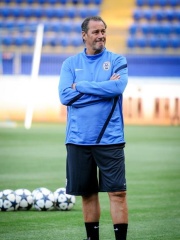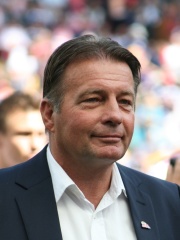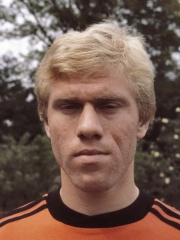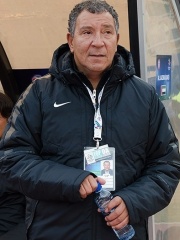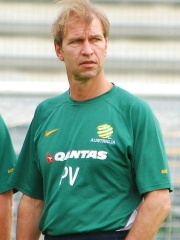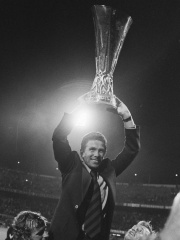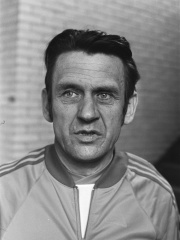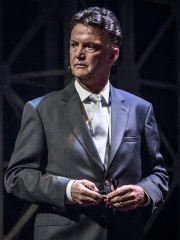
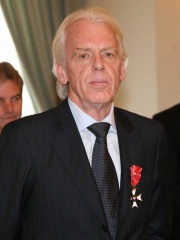
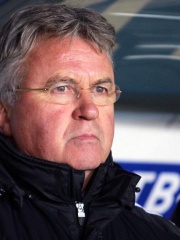
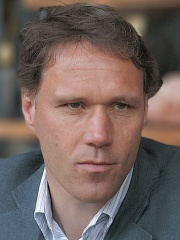
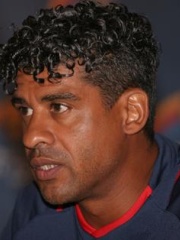
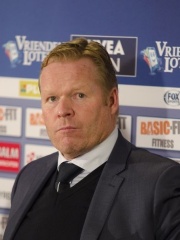
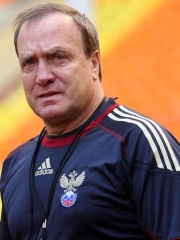
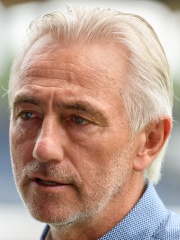
The Most Famous
COACHES from Netherlands
This page contains a list of the greatest Dutch Coaches. The pantheon dataset contains 471 Coaches, 25 of which were born in Netherlands. This makes Netherlands the birth place of the 6th most number of Coaches behind Spain, and Brazil.
Top 10
The following people are considered by Pantheon to be the top 10 most legendary Dutch Coaches of all time. This list of famous Dutch Coaches is sorted by HPI (Historical Popularity Index), a metric that aggregates information on a biography's online popularity. Visit the rankings page to view the entire list of Dutch Coaches.

1. Louis van Gaal (b. 1951)
With an HPI of 75.85, Louis van Gaal is the most famous Dutch Coach. His biography has been translated into 63 different languages on wikipedia.
Aloysius Paulus Maria "Louis" van Gaal (Dutch pronunciation: [luˈʋi vɑŋ ˈɣaːl] ; born 8 August 1951) is a Dutch former football player and former manager who currently serves as an advisor for Ajax. At club level, he served as manager of Ajax, Barcelona, AZ, Bayern Munich and Manchester United, as well as having three spells in charge of the Netherlands national team. Van Gaal has won 20 major honours in his managerial career at club level, along with 3 stints as coach of the Dutch national team. He is nicknamed the "Iron Tulip". Before his career as a coach, Van Gaal played as a midfielder for Royal Antwerp, Telstar, Sparta Rotterdam, Ajax and AZ. He is also a qualified physical education teacher, and worked at high schools during his career as a semi-professional footballer. After a brief spell as an assistant coach at AZ, Van Gaal served as an assistant under Leo Beenhakker at Ajax, and eventually took over as head coach in 1991. Under his lead, the club won three Eredivisie titles, the UEFA Cup and the UEFA Champions League. He moved to Barcelona in 1997 and won two league titles and one Copa del Rey, but left after disagreements with the club's hierarchy. Van Gaal was then appointed at the Netherlands, but failed to qualify for the 2002 FIFA World Cup. This preceded another brief spell at Barcelona, before he returned to AZ, where he won an Eredivisie title, the club's second ever in its history. He moved to Bayern Munich in 2009, and in Germany won the Bundesliga, the DFB-Pokal and reached the final of the UEFA Champions League. He returned to manage the Netherlands for a second time, where he led the nation to a third-place finish at the 2014 FIFA World Cup. He was appointed manager of Manchester United later that summer, where he won the FA Cup before he was dismissed only days later. Despite announcing his retirement in 2019, due to family reasons, Van Gaal returned to management in August 2021, when he was appointed as head coach of the Netherlands for a third time. He retired from management after the 2022 FIFA World Cup.

2. Leo Beenhakker (1942 - 2025)
With an HPI of 75.46, Leo Beenhakker is the 2nd most famous Dutch Coach. His biography has been translated into 39 different languages.
Leo Beenhakker (Dutch: [ˈleːjoː ˈbeːnɦɑkər]; 2 August 1942 – 10 April 2025) was a Dutch football player and coach. Nicknamed "Don Leo" for his role in Spanish football, he had an extensive and successful career both at club and international level. After his amateur playing career ended at 19 through injury, he began his coaching career. He won the Eredivisie title twice with Ajax and once with Feyenoord, becoming the only person to do so with both rival teams. In Spain he won three consecutive La Liga titles with Real Madrid in the late 1980s, including one as a double with the Copa del Rey. Additionally, he had brief spells in the top divisions of Switzerland, Mexico and Turkey. At international level, he led the Netherlands at the 1990 FIFA World Cup, Trinidad and Tobago to the 2006 FIFA World Cup and Poland to UEFA Euro 2008, the latter two being firsts for both nations.

3. Guus Hiddink (b. 1946)
With an HPI of 75.16, Guus Hiddink is the 3rd most famous Dutch Coach. His biography has been translated into 57 different languages.
Guus Hiddink (Dutch pronunciation: [ˈɣys ˈɦɪdɪŋk] ; born 8 November 1946) is a Dutch former football manager and professional player. He enjoyed a long career playing as a midfielder in his native Netherlands. After retiring as a player in 1982, Hiddink went into management, leading clubs and countries from across the globe to achieve various titles and feats. With PSV Eindhoven he won the European Champion Clubs' Cup, the predecessor of the UEFA Champions League. With Real Madrid he won the Intercontinental Cup.

4. Marco van Basten (b. 1964)
With an HPI of 74.92, Marco van Basten is the 4th most famous Dutch Coach. His biography has been translated into 78 different languages.
Marcel "Marco" van Basten (Dutch pronunciation: [ˈmɑrkoː vɑm ˈbɑstə(n)] ; born 31 October 1964) is a Dutch former football manager and player who played as a striker for Ajax and AC Milan, as well as the Netherlands national team. Widely regarded as one of the greatest players of all time, he scored 300 goals in a high-profile career, but played his last match in 1993, at the age of 28, due to a recurring ankle injury which forced him to announce his retirement two years later. He was later the head coach of Ajax and the Netherlands national team. Known for his close ball control, attacking intelligence, impeccable headers, and spectacular strikes and volleys, Van Basten was named FIFA World Player of the Year in 1992 and won the Ballon d'Or three times, in 1988, 1989 and 1992. At club level, he won three Eredivisie titles and the Cup Winners' Cup with Ajax, and four Serie A titles and two European Cups with Milan. With the Netherlands, Van Basten won UEFA Euro 1988 where he earned the Golden Boot, scoring five goals, including a memorable volley in the final against the Soviet Union, considered one of the best ever. In 1998, Van Basten was ranked sixth in the FIFA Player of the Century internet poll, tenth in the European player of the Century election held by the IFFHS and 12th in the IFFHS' World Player of the Century election. He was also voted eighth in a poll organised by the French magazine France Football, consulting their former Ballon d'Or winners to elect the Football Player of the Century. In 2004, he was named by Pelé in the FIFA 100 list of the world's greatest living players. In 2004, a poll for the 100 greatest Dutch people was held in the Netherlands: Van Basten ranked number 25, the second highest for a football player, behind Johan Cruyff. In 2007, Sky Sports ranked Van Basten first on its list of great athletes who had their careers cut short.
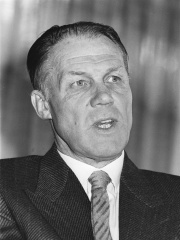
5. Rinus Michels (1928 - 2005)
With an HPI of 74.34, Rinus Michels is the 5th most famous Dutch Coach. His biography has been translated into 45 different languages.
Marinus Jacobus Hendricus "Rinus" Michels (Dutch pronunciation: [ˈrinʏs ˈmɪxəls] ; 9 February 1928 – 3 March 2005) was a Dutch football player and coach. He played his entire career for Ajax, which he later managed, and played for and later managed the Netherlands national team for four spells. Throughout his career, he played as a forward. He is regarded as one of the greatest managers of all time. Michels became most notable for his coaching achievements; he won the European Cup with Ajax and the Spanish league with Barcelona, and had four tenures as coach of the Netherlands national team, who he led to reach the final of the 1974 FIFA World Cup and to win the 1988 UEFA European Championship. He is credited with the invention of a major football playing style and set of tactics known as "Total Football" in the 1970s. He was named Coach of the Century by FIFA in 1999, in 2007 the greatest post-war football coach by The Times and in 2019 the greatest coach in the history of football by France Football.

6. Frank Rijkaard (b. 1962)
With an HPI of 73.02, Frank Rijkaard is the 6th most famous Dutch Coach. His biography has been translated into 64 different languages.
Franklin Edmundo Rijkaard (Dutch pronunciation: [ˈfrɑŋklɪn ˈɛtmundoː ˈfrɑŋk ˈrɛikaːrt] ; born 30 September 1962) is a Dutch former football player and manager who primarily played as a defensive midfielder. Regarded as one of the greatest midfielders of all time, Rijkaard played for Ajax, Real Zaragoza and AC Milan. With Ajax, he won five Eredivisie titles and the 1994–1995 Champions League. With AC Milan, he won Serie A titles, as well as the 1988–89 and 1989–90 European Cup (Champions League) titles. Rijkaard earned 73 caps for the Netherlands national team. He was part of the team that won the 1988 European championship and finished third in the 1992 European championship. He also played in the 1990 and 1994 World Cups. In his managerial career, he is most well known for his five-year tenure at Barcelona where he won the 2004–05 and 2005–06 La Liga titles, as well as the 2005–06 Champions League. He has also managed the Netherlands national team, Sparta Rotterdam, Galatasaray and the Saudi Arabia national team.

7. Ronald Koeman (b. 1963)
With an HPI of 72.03, Ronald Koeman is the 7th most famous Dutch Coach. His biography has been translated into 61 different languages.
Ronald Koeman (Dutch pronunciation: [ˈroːnɑlt ˈkumɑn] ; born 21 March 1963) is a Dutch professional football manager and former player who is the manager of the Netherlands national team. Koeman scored over 250 goals whilst playing in defence for the majority of his career. Koeman was capable of playing both as a defender and as a midfielder; he frequently played as a sweeper, although he was equally known for his goalscoring, long-range shooting, and accuracy from free kicks and penalties. Because of his goalscoring, he is considered one of the best attacking center backs of all time. Born in Zaandam, Koeman began his career at Groningen before transferring to the Netherlands' most successful club Ajax in 1983, where they won the national Eredivisie title in 1984–85. He then joined Ajax's rivals PSV in 1986, winning three consecutive Eredivisie titles (1986–87, 1987–88 and 1988–89) and the European Cup in 1988. Ronald Koeman is one of five European players to ever win a treble with their club and a cup with their national team in the same year. The other four players are his teammates Hans van Breukelen, Berry van Aerle, Gerald Vanenburg and Wim Kieft. In 1989, Koeman moved to Barcelona and became part of Johan Cruyff's "Dream Team", helping the club win La Liga four consecutive seasons (1991 to 1994), and the 1991–92 European Cup, where he scored the winning goal of the final against Sampdoria. At international level, Koeman was one of the stars of the Netherlands national team, alongside Marco van Basten, Ruud Gullit, Frank Rijkaard and Dennis Bergkamp. During his career with the Netherlands, Koeman won UEFA Euro 1988 and played at UEFA Euro 1992, as well as the 1990 and 1994 FIFA World Cups, captaining the team at the latter. In his managerial career, Koeman has won three Eredivisie titles: twice with Ajax (2001–02 and 2003–04) and once with PSV (2006–07). He is the only individual to have both played for and managed the "Big Three" of Dutch football: Ajax, PSV and Feyenoord. Abroad, he had spells in Portugal with Benfica and Spain with Valencia, coaching Los Ché to victory in the 2007–08 Copa del Rey, and managed Premier League clubs Southampton and Everton in the 2010s. He was the manager of the Netherlands national team between 2018 and 2020, finishing runners-up in the 2019 UEFA Nations League. In August 2020, he was appointed manager of Barcelona, with whom he won the 2020–21 Copa del Rey, but was sacked in October 2021, following a poor start to the new season. In 2023, he was reappointed as the manager of the Netherlands national team.

8. Dick Advocaat (b. 1947)
With an HPI of 70.50, Dick Advocaat is the 8th most famous Dutch Coach. His biography has been translated into 46 different languages.
Dirk Nicolaas "Dick” Advocaat (Dutch pronunciation: [ˈdɪk ɑtfoːˈkaːt] ; born 27 September 1947) is a Dutch former football player and coach. He is currently the manager of the Curaçao national football team. Advocaat was successful as a football player and as a coach. He has coached a number of clubs in the Netherlands and abroad (including the Russian club Zenit Saint Petersburg, with which he won the 2008 UEFA Cup Final), as well as the national teams of a number of countries, including South Korea, Belgium and Russia. His nickname is "The Little General", a reference to his mentor Rinus Michels.

9. Bert van Marwijk (b. 1952)
With an HPI of 67.33, Bert van Marwijk is the 9th most famous Dutch Coach. His biography has been translated into 44 different languages.
Lambertus van Marwijk (Dutch pronunciation: [ˈbɛrt fɑ ˈmɑrʋɛik]; born 19 May 1952) is a Dutch football manager who is a member of the supervisory board for MVV Maastricht. As a player, he played for the Go Ahead Eagles, AZ, MVV and Fortuna Sittard amongst other clubs and also represented the Netherlands once. In 1982, van Marwijk began his transition into a manager, retiring as a player in 1988 and becoming a full-time manager. In 2002, he won the UEFA Cup with Feyenoord. Van Marwijk managed the Netherlands from 2008 until June 2012 and guided the country to the 2010 FIFA World Cup final, which was lost 1–0 in extra-time to Spain. He left this position after losing all three matches at UEFA Euro 2012. He qualified Saudi Arabia for the 2018 FIFA World Cup but left before the World Cup began; he promptly coached Australia during the tournament.
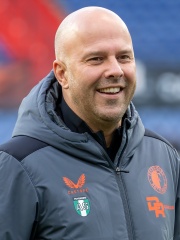
10. Arne Slot (b. 1978)
With an HPI of 63.17, Arne Slot is the 10th most famous Dutch Coach. His biography has been translated into 44 different languages.
Arend Martijn "Arne" Slot (Dutch pronunciation: [ˈaːrənt mɑrˈtɛin ˈɑrnə ˈslɔt]; born 17 September 1978) is a Dutch professional football manager and former player who is the head coach of Premier League club Liverpool. Slot played as a midfielder for FC Zwolle, where he won the Eerste Divisie in 2002, NAC Breda and Sparta Rotterdam before retiring as a player back at PEC Zwolle, where he won another Eerste Divisie title in 2012. He started his managerial career in the academy of PEC Zwolle and as an assistant at Cambuur before taking over as co-head coach at the latter. In 2017, he became an assistant at AZ, where he was appointed head coach in 2019. Slot became head coach of Feyenoord in 2021. He led the club to the 2022 UEFA Europa Conference League final in his first season and won the club the Eredivisie and the KNVB Cup in subsequent seasons. He joined Liverpool in 2024, leading the side to a Premier League title in his first season at the club and becoming the first Dutch manager to win the competition.
People
Pantheon has 25 people classified as Dutch coaches born between 1924 and 1978. Of these 25, 20 (80.00%) of them are still alive today. The most famous living Dutch coaches include Louis van Gaal, Guus Hiddink, and Marco van Basten. The most famous deceased Dutch coaches include Leo Beenhakker, Rinus Michels, and Pim Verbeek.
Living Dutch Coaches
Go to all RankingsLouis van Gaal
1951 - Present
HPI: 75.85
Guus Hiddink
1946 - Present
HPI: 75.16
Marco van Basten
1964 - Present
HPI: 74.92
Frank Rijkaard
1962 - Present
HPI: 73.02
Ronald Koeman
1963 - Present
HPI: 72.03
Dick Advocaat
1947 - Present
HPI: 70.50
Bert van Marwijk
1952 - Present
HPI: 67.33
Arne Slot
1978 - Present
HPI: 63.17
Huub Stevens
1953 - Present
HPI: 61.97
Co Adriaanse
1947 - Present
HPI: 60.72
Wim Rijsbergen
1952 - Present
HPI: 59.21
Henk ten Cate
1954 - Present
HPI: 58.97
Deceased Dutch Coaches
Go to all RankingsLeo Beenhakker
1942 - 2025
HPI: 75.46
Rinus Michels
1928 - 2005
HPI: 74.34
Pim Verbeek
1956 - 2019
HPI: 61.25
Wiel Coerver
1924 - 2011
HPI: 60.30
Jan Zwartkruis
1926 - 2013
HPI: 56.55
Overlapping Lives
Which Coaches were alive at the same time? This visualization shows the lifespans of the 5 most globally memorable Coaches since 1700.

